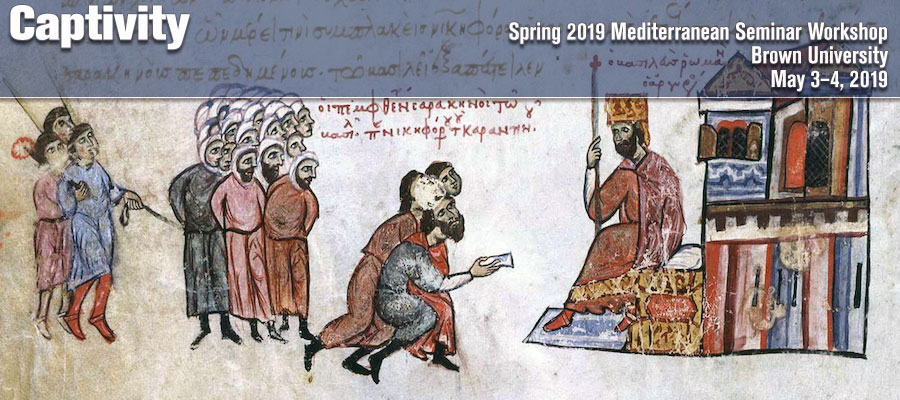Captivity, Spring 2019 Mediterranean Seminar Workshop, Brown University, May 3–4, 2019
Paper proposals and round-table participants are being sought for the Mediterranean Seminar’s two-day Spring 2019 Meeting, to be held at Brown University on 3 & 4 May 2019 on the subject “Captivity.”
Traumatic, brutal and violent dynamics of captivity and bondage were crucial to the formation of Mediterranean cultures and institutions, and to the circulation of ideas as well as peoples. The Mediterranean presents an ideal geography within which to explore some larger issues raised by captivity: power structures, race and ethnicity, inter-religious and inter-cultural relations, gender, economic networks, and violence. The great inland sea is the space where Europe, North Africa, and the Middle East meet; Mediterranean practices of captivity came to have still more global implications with the spread of European colonialism. Contemporary crises in the displacement, migration, and resettlement of refugees in Afroeurasia tragically underscore the ongoing relevance of this problem in the modern day.
For the workshop (to be held on Friday, 3 May), we invite abstracts of in-progress drafts of articles or book/dissertation chapters on any aspect (historical, cultural, literary, artistic, or historiographical) of captivity in the premodern or modern Mediterranean, broadly construed (including captive and hostage taking, enslavement of captives, ransoming, captives’ experience, literary and visual representations of captivity).
Particularly welcome are papers (a) relating to the multi-religious/ethnic environment of the region, including cross-confessional influence, relations, syncretism, and literary and/or artistic representations; or (b) papers that address the longue durée, methodology, or that are comparative in approach. Papers from history, art history, literary and cultural studies, or any relevant Humanities or Social Sciences discipline are welcome. Our Mediterranean is construed geographically as including southern Europe, the Near East and North Africa and into the Black Sea and Central Asia, and the Red Sea and Indian Ocean; however scholars who work on analogous themes in other periods and regions are encouraged to apply.
All North American-based scholars (or foreign scholars who will be in the US at this time) working on relevant material are encouraged to apply. Scholars from further abroad may apply but we cannot pay full travel costs. ABD PhD students, junior and non-tenure track faculty are particularly welcome to apply.
The workshop will also feature a keynote presentation by Gillian Weiss, Associate Professor of History at Case West Reserve and author of Captives and Corsairs: France and Slavery in the Early Modern Mediterranean (Stanford, 2011).
The second day, Saturday, 4 May, will feature three round-table conversations, focusing on the following questions:
- Was captivity a contributor to inter-cultural rapprochement or opposition? Besides captivity, what other mechanisms of constraint characterized Mediterranean exchanges?
- Was there something distinctly “Mediterranean” about Mediterranean captivity?
- How did gender and captivity shape each other in the premodern Mediterranean?
Participants will be expected to attend the entire two-day symposium.
